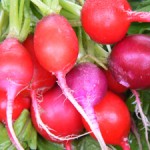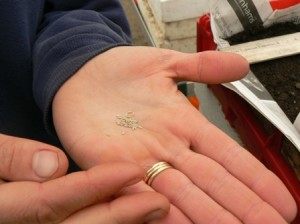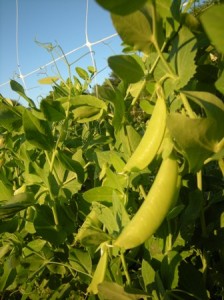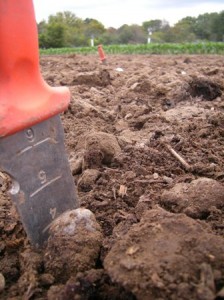Guest post by Matt C., Crops Manager, and Lana C., Crops Apprentice, at Drumlin Farm.
 One of our returning Summer CSA members recently wrote to us about a conversation her husband had with their son.
One of our returning Summer CSA members recently wrote to us about a conversation her husband had with their son.
“My husband asked our 6 year-old the names of grocery stores, and his first response was Drumlin Farm. I have to say that his answer thrilled us! He knows where his food comes from, he understands that food grows on farms and in fields, and that people plant seeds, work the earth, and harvest the food.”
 His answer thrilled us as well! Here at Drumlin Farm, between our livestock and crops operations, we strive to provide food to our community year-round. The next 60 days of preparations will be essential to the success of the 2013 growing season. We are busy planting eggplant, broccoli, cauliflower, cabbage, basil, and flowers in the greenhouse, where onions, scallions, leeks, and beets have already unfurled and are reaching for the sun. Our seed potatoes have been arranged in a sunny window in order to grow the sprouts that will later become lush, crawling plants and hearty tubers. This is called green-sprouting, and it gives the potatoes a head-start so that their growth can outpace the Colorado potato beetle.
His answer thrilled us as well! Here at Drumlin Farm, between our livestock and crops operations, we strive to provide food to our community year-round. The next 60 days of preparations will be essential to the success of the 2013 growing season. We are busy planting eggplant, broccoli, cauliflower, cabbage, basil, and flowers in the greenhouse, where onions, scallions, leeks, and beets have already unfurled and are reaching for the sun. Our seed potatoes have been arranged in a sunny window in order to grow the sprouts that will later become lush, crawling plants and hearty tubers. This is called green-sprouting, and it gives the potatoes a head-start so that their growth can outpace the Colorado potato beetle.
 We have started planting the fields with varieties of peas, spinach, radish, field greens, and fava beans. These seeds are sown directly into the ground. We will soon uncover the blankets of straw mulch that have been protecting our garlic and strawberries throughout the winter, weeding our autumn-bearing raspberries and perennial herb garden, and spreading wood chips from the local tree-care companies in order to suppress weeds. Potatoes and onions will be transplanted in the end of April and early May.
We have started planting the fields with varieties of peas, spinach, radish, field greens, and fava beans. These seeds are sown directly into the ground. We will soon uncover the blankets of straw mulch that have been protecting our garlic and strawberries throughout the winter, weeding our autumn-bearing raspberries and perennial herb garden, and spreading wood chips from the local tree-care companies in order to suppress weeds. Potatoes and onions will be transplanted in the end of April and early May.
Compost from our farm’s livestock will be spread on fields that are coming out of a two-year fallow period in our crop rotation, and the beds that will be sown with  seeds this spring will soon be plowed. We will be sowing an early pea cover crop in fields that will be transplanted with seedlings from the greenhouse later in the spring. The practice of spring cover-cropping adds organic matter to the soil and provides more nutrients to the plants later in the season. Healthy soil plays a vital role in our crops operation – it allows us to forego using any chemical pesticides, herbicide, or fertilizers, and we rely solely on natural precipitation to irrigate our fields.
seeds this spring will soon be plowed. We will be sowing an early pea cover crop in fields that will be transplanted with seedlings from the greenhouse later in the spring. The practice of spring cover-cropping adds organic matter to the soil and provides more nutrients to the plants later in the season. Healthy soil plays a vital role in our crops operation – it allows us to forego using any chemical pesticides, herbicide, or fertilizers, and we rely solely on natural precipitation to irrigate our fields.
While raising nutritious, ecologically responsibly grown food is valuable, the practice is moot without a supportive network of people with which to share our bounty. We are thrilled that a 6 year-old boy and his family celebrate their close connection to their local, sustainable food source and share in our harvest at their family’s table. Visit our website to learn more about our CSA.

